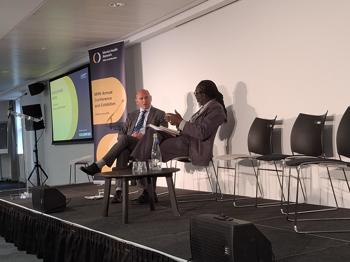
Packed with insightful talks, candid panel discussions, and contributions from lived experience leaders, the day provided valuable perspectives on the future of mental health and learning disability services. It was also a fantastic opportunity to connect with peers, partners and professionals from across the health and care system - all committed to the vision of making joined-up care a reality.
Here’s our full overview of the day’s sessions we attended, along with the key themes, highlights and reflections.
Shaping a Plan That Includes Everyone
What the 10-Year Plan Means for Mental Health and Learning Disabilities
Speakers: Dr Ify Okocha (Chair, Oxleas NHS FT), Sally Warren (Director, 10-Year Plan, DHSC), Lord Victor Adebowale (Chair, NHS Confederation), Marsha McAdam (Vice-Chair, Mental Health Network)
Kicking off the day was the morning session on what the NHS 10-Year Plan could and should mean for people with mental health needs, learning disabilities and autism.
Sally Warren, Director General for the 10-Year Plan at the Department of Health and Social Care, opened the session and talked about the nationwide engagement they’ve had with the plan so far, including over 250,000 contributions from the public through local support groups and feedback initiatives like Change NHS, and what the three shifts (from hospital to community, analogue to digital and from sickness to prevention) could look like for mental health.
She stressed that the plan would centre patient power, population-based care, and reducing inequalities, but she also acknowledged public scepticism, saying the NHS must first rebuild trust before introducing a “new social contract” with patients.
Victor Adebowale, Chair of the NHS Confederation, was straight-talking in his response. He warned that growing demand for support, especially from groups previously ignored, must not be underestimated. “We know that there are probably 400,000 children and adults who have not been assessed” for autism and ADHD, he said. These conditions, once barely discussed, are now widely prevalent, and their links with mental health challenges demand serious system attention. He also called for greater transparency around how funding is allocated, warning that mental health has too often been “squeezed more than everything else” without clear accountability.
“This plan has to survive the first punch,” he added, referencing Mike Tyson’s famous line. He argued that mental health leaders are already delivering on the very shifts the wider NHS is only now prioritising. He urged the system to learn from them, particularly around digital innovation, integrated care and community-based models. “Mental health has had to do more with less for decades, and still it’s ahead of the curve in many areas,” he noted.
Perhaps the most powerful contribution came from Marsha McAdam, Vice Chair of the Mental Health Network and a suicide survivor with lived experience of borderline personality disorder. She spoke candidly about how long it took to receive meaningful support, and how life-changing early intervention could be for young people in similar circumstances. “When I finally got a diagnosis, it was the first time I felt like I wasn’t evil,” she shared. Her call for sustained, respectful involvement of people with lived experience was a sentiment shared throughout the room: “Me using my voice means I have purpose. I have an identity.”
All speakers concluded that the plan needs to revolve around transparency, trust and action. Victor concluded that the sector’s credibility depends on tackling inequality - not just within NHS mental health services but within all areas of health and care - head-on, especially in relation to race and neurodivergency. If the 10-Year Plan is to deliver lasting change, it must listen, act and stay accountable to those it claims to serve.
A Sector Under Pressure but Not Without Potential
Director’s Address: Rebecca Gray, Mental Health Network
Rebecca Gray’s short talk struck a balance between realism and resolve. She spoke plainly about the pressures facing mental health services and the urgent need for investment, but also highlighted the sector’s strengths and its central role in shaping the NHS’s future.
Gray stressed that mental health must be seen not just through a healthcare lens, but as a vital component of economic and social policy. With over £300 billion now attributed to the socio-economic cost of mental ill health, now more than ever, there is a fundamental need for joined-up thinking across government.
One of the strongest messages was the sector’s readiness to lead. Many of the shifts outlined in the upcoming 10-Year Plan - from prevention to digital transformation - are already being delivered across mental health services. But Gray warned that these achievements often go unrecognised: “It feels very negative at the moment, but there are brilliant examples of care happening everywhere. We can’t lose sight of that.”
The NHS CEO’s Vision for Joined-Up Care
Morning Keynote with NHS CEO Jim Mackey: Sir Jim Mackey – Chief Executive, NHS England, Lord Victor Adebowale – Chair, NHS Confederation (Session Chair)
The opening keynote delivered the kind of honesty many in the mental health NHS community have long been waiting for. In a candid conversation, newly-appointed CEO of NHS England, Jim Mackey, was joined again by Victor Adebowale, to speak plainly about the pressures on the system and the need to prioritise mental health more seriously.
He said that mental health has been “crowded out” in recent years, losing visibility to urgent and elective priorities. He called for a shift away from over-complicated, centralised systems that have “not been working,” and instead urged a rebalancing toward the whole service and the whole population.
What stood out was Sir Jim’s willingness to take responsibility. Despite coming from an acute background with mental health being in his words “new territory”, he committed to working closely with Claire Murdoch and other sector leaders to ensure that “you [mental health] get a seat at the table.” He also promised mental health would be properly represented in conversations about capital investment, incentives and delivery of the 10-Year Plan.
The conversation didn’t sugar-coat the challenges: hidden waiting lists, disconnection from the public, and years of underinvestment were all discussed openly. But Mackey struck notes of optimism, particularly around the potential for lasting change. “We know the service works better when it’s liberated and when people feel empowered to take control of their own destiny,” he said. “Now it’s about making changes that last.” His remarks reflected a renewed determination to move past temporary fixes and towards a more sustainable, people-driven NHS.

Transforming Care in Community Mental Health Services
Transforming Care in Community Mental Health Services
Speakers: Philippa Mariani (CEO, Think Ahead), Claire Murdoch (National Mental Health Director, NHS England), Dr Selvaraj Vincent (Clinical Lead, Birmingham & Solihull MHFT), Haris Sultan (ICB and lived-experience representative)
This session cut to the heart of what community transformation in mental health should mean when it comes to new models, but also a fundamental rethink of what matters to people in crisis.
Haris Sultan, an ICB representative, shared his lived experience of mental health care and the powerful personal journey that brought him to the stage today. He described how a suicide prevention charity saved his life by offering support without thresholds, bureaucracy, or delay - something he couldn’t easily access through the NHS. Later, when in crisis again, it was an NHS home treatment team that delivered daily care and stability, helping him recover at home without disrupting his daily routine or taking him away from his support network, i.e., his partner – which he claimed were both integral to his recovery. His message was clear: care must feel human, timely, and grounded in people’s lives - not built around risk scores or red tape.
Claire Murdoch echoed this sentiment, warning against complacency. While there has been progress in areas like expanding community services and early intervention, too many people still fall through the cracks. She highlighted the six new pilot neighbourhood mental health centres as a model for more holistic, integrated care: open access, 24/7 support and real partnership with local VCSE organisations and people with lived experience.
Dr Selvaraj Vincent, leading one of the pilots in Birmingham, described how the service is actively dismantling barriers: “We are not asking for referrals. We are not asking for thresholds. We are not asking for exclusions.” Instead, the model centres support around people’s life goals, backed by a wide network of community groups.
Proven Models for Youth Mental Health and Wellbeing That Actually Work
A Healthy Start: Lessons in Early Intervention and Prevention for Children and Young People: Dr Phil Moore – Director, Kingston GP Federation (Session Chair), Laura Earnshaw – CEO & Founder, My Happy Mind, Val O'Donnell – Senior Manager, Young Person's Advisory Service
This well-attended breakout session explored the role of schools, community services and co-produced youth-led initiatives in delivering early intervention and prevention for children and young people’s mental health. Phil Moore set the context for the session and highlighted the rising demand for support, persistent funding gaps and the risk of over-medicalising normal adolescent distress. He called for a sustained, preventive approach, noting the critical window before age 18 when most lifelong mental health conditions emerge.
Laura Earnshaw, founder of myHappymind, presented her curriculum-based programme designed to support emotional regulation, self-esteem and resilience in primary-aged children. She emphasised that prevention is most impactful when embedded within the school day. Data from participating schools indicates that, after just one year, myHappymind schools experience a 67% decrease in children requiring SENCo support, a 60% reduction in fixed-term exclusions, and a 43% decrease in CAMHS referrals.
Similar successes were showcased by Val O’Donnel, from Liverpool-based YPAS (Young Person’s Advisory Service). She described their integrated, open-access model for 5–25 year-olds that combines therapeutic and practical support under one roof. In 2024 alone, the organisation provided 30,721 appointments and consultations of therapy and support to young people, helping to reduce pressure on statutory systems, cut down referrals, improve school attendance and enhance social and emotional wellbeing.
Finally, a lived experience representative for Our Naked Truths, reflected on her personal experience of falling through the cracks in mental health services. This led to the launch of a highly-successful, youth-driven resource platform to fill the gap in culturally relevant support. She stressed the need to move away from “tokenistic gestures,” listen to young people, and let their experiences shape the support on offer to better meet their needs.

Building a Stronger NHS Through Mental Health Leadership
Afternoon Keynote: Matthew Taylor, CEO of NHS Confed
Closing the day’s agenda was NHS Confed Chief Exec, Matthew Taylor, who reflected on the strength of the mental health sector - not just as a part of the system, but as a model for where the wider NHS needs to go. In a thoughtful and warm address, he recognised the ongoing challenges facing providers, from sustained financial pressure to rising demand, but urged the room to remain proud of the progress made.
Taylor emphasised that when it comes to the three major shifts ahead, mental health is already ahead of the curve. From pioneering community-based models to embedding partnerships with VCSE providers and delivering person-centred care, the sector “has already made the shift others are still talking about.”
Taylor reminded the room that mental health too often remains an afterthought in national policy conversations, urging leaders to “keep fighting” for its proper place in the NHS 10-Year Plan. He called for more respectful, collaborative dialogue from the centre, and emphasised that real change happens when leadership is supported to balance short-term pressures with long-term vision. “We’re here to help you do more with less,” he said, “but we’re also here to remind the system that mental health isn’t peripheral - it’s foundational to a better NHS.”
A System Ready to Deliver - If the 10-Year Plan Lets It
If there’s one thing this year’s conference made clear, it’s that mental health leaders, practitioners and people with lived experience aren’t waiting for permission to improve services - they’re already doing it. From preventative models in schools to integrated crisis support in communities, the innovations many hope to see in the upcoming NHS 10-Year Plan are already being delivered, but how it moves forward to scale these innovations and solutions will be key.
We now have a golden opportunity to implement what we know actually works and remove the barriers holding back progress. If it gets it right, the 10-Year Plan won’t just shape the future of mental health support - it will finally unlock the full potential of a system that’s long been ready to lead.

